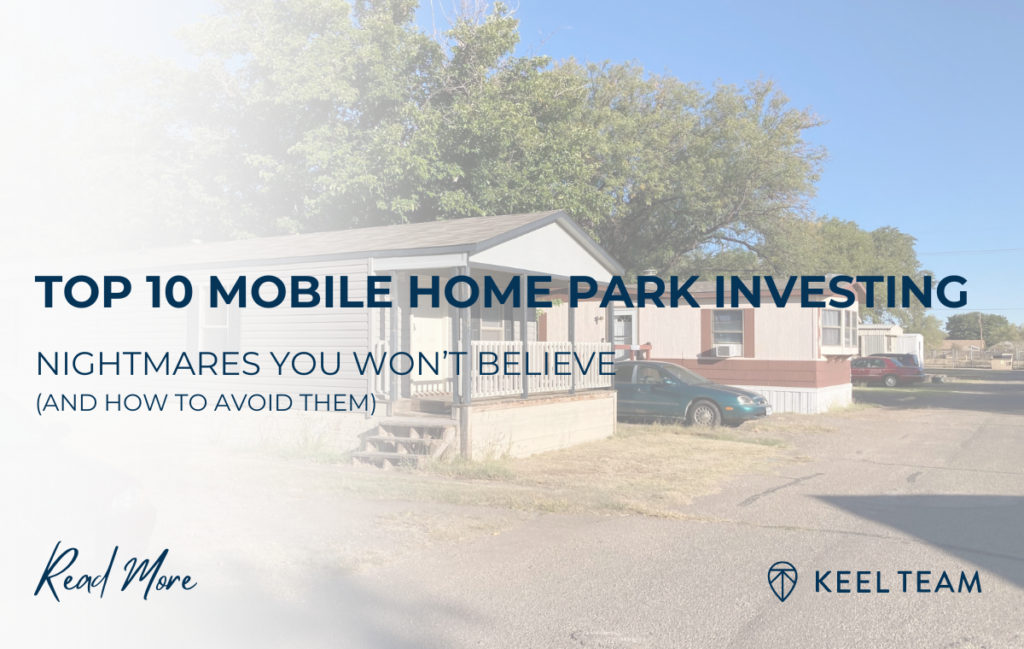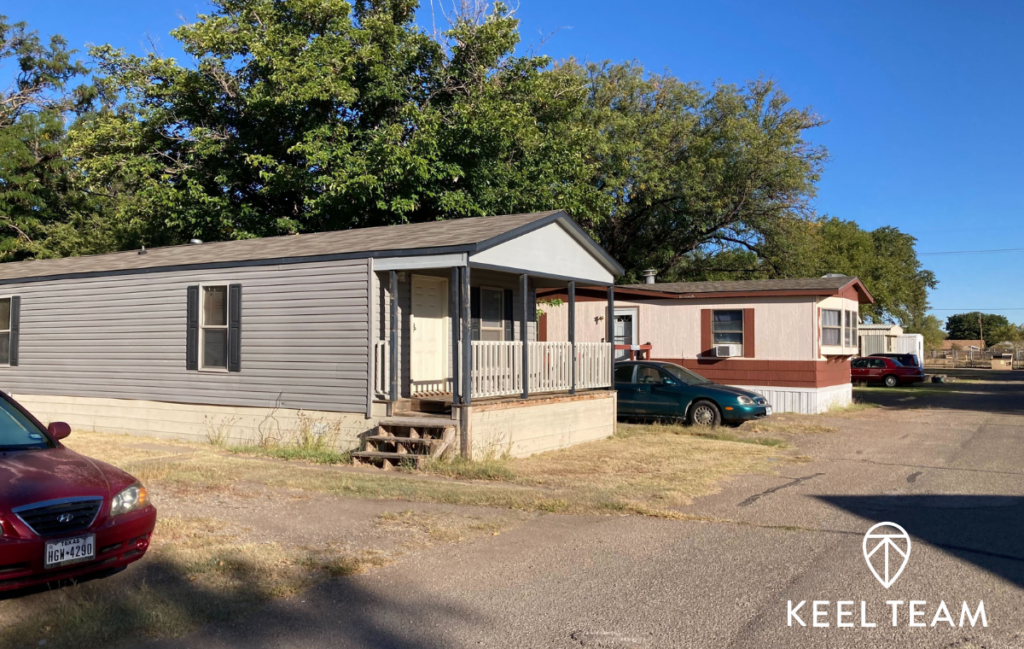Top 10 Mobile Home Park Investing Nightmares You Won’t Believe
-
 Tristan Hunter - Investor Relations
Tristan Hunter - Investor Relations

Mobile home park investing has great potential for cash flow and long-term returns, but as with any investment, it comes with risks. In this article, we explore some unbelievable challenges that investors have faced—along with the strategies used to overcome them. These real-life stories highlight why due diligence, good management, and proactive planning are essential for success in mobile home park investing.
1. Chemical Contamination in Pennsylvania
In 2019, a mobile home park in Western Pennsylvania faced a crisis when vandals contaminated the water supply by dumping harmful chemicals into the system. The contamination left about 50 homes without clean water, leading to significant repair and cleanup costs.
How to Avoid It: Conduct a thorough environmental assessment before purchasing a mobile home park, and make sure proper security is in place to protect critical infrastructure like water and sewage systems.
2. Mass Tenant Exodus in Arizona
An investor in Phoenix, Arizona, attempted to raise lot rents by 15% after acquiring a mobile home park in 2021. However, this increase backfired when over half the tenants abandoned their homes. The investor didn’t account for the limited financial flexibility of the tenants, leading to a significant revenue drop.
How to Avoid It: Gradually increase rents in line with local market conditions. Understanding tenant demographics is essential. Offering value, such as property improvements or additional amenities, can justify rent increases and keep tenants happy.
3. Abandoned Homes in North Carolina
In 2017, Brenda Owens purchased a mobile home park in Fayetteville, North Carolina, only to find that 30% of the homes were abandoned. These homes required either extensive renovations or demolition, which delayed her ability to fill lots and generate income.
How to Avoid It: Conduct a detailed inspection of all homes on the property before purchase. Factor in the cost of rehabilitating or removing abandoned homes when analyzing the deal. Negotiating with sellers based on these findings can protect your financial interests.
4. Infrastructure Disaster in Ohio
In 2020, an investor in Columbus, Ohio, was caught off guard when the mobile home park he purchased had an outdated sewer system that needed immediate replacement. The cost of repairs exceeded $150,000, wiping out years of projected profits.
How to Avoid It: Hire professional inspectors to evaluate the mobile home park’s infrastructure, including water and sewer systems, before buying. This will help you anticipate major repair costs and negotiate better terms with the seller.
5. Title Issues in Texas
Mary Evans bought a mobile home park in San Antonio, Texas, in 2018, only to discover that several lots weren’t included in the title. Legal battles ensued with neighboring landowners, leading to unexpected costs and delays.
How to Avoid It: Always perform a thorough title search to ensure that you are purchasing the entire property, with no encumbrances or legal issues that could complicate ownership.
Do you want to avoid these same mistakes? Download our FREE eBook , by Andrew Keel, and learn how to prepare yourself before buying a mobile home park!

6. Septic System Failure in Florida
In Tampa, Florida, Todd Harris purchased a mobile home park in 2020. Shortly after the deal closed, the mobile home park’s septic system failed, causing raw sewage to back up into homes. Repair costs exceeded $100,000 and disrupted tenant life for months, resulting in lost revenue as tenants moved out.
How to Avoid It: Septic systems require regular maintenance. Ensure a professional septic inspection is completed during due diligence. Plan for future maintenance costs and set aside reserves to handle unexpected breakdowns. Private utilities are typically more risky, try to opt for public utilities where you can.
7. Zoning Issues in Colorado
In 2019, Tom Butler attempted to expand a mobile home park in Boulder, Colorado, by adding more lots. However, the local government rejected his zoning application, citing a recent ordinance against mobile home park expansions. Butler was left with undeveloped land and unrealized potential income.
How to Avoid It: Before purchasing a mobile home park, check with local zoning authorities to understand any restrictions on expansion or development. This will prevent costly surprises if you plan to grow the trailer park.
8. Rampant Crime in Georgia
In 2018, an investor from out of state purchased a mobile home park in Macon, Georgia. Crime rates in the area were higher than expected, and despite the investor’s efforts to improve security, drug-related incidents and vandalism persisted. The trailer park became unmanageable, and the investor sold at a loss.
How to Avoid It: Conduct extensive research on the local area, including crime statistics. Investing in security measures such as lighting, cameras, and gated access can help reduce criminal activity and make the trailer park more attractive to residents.
9. Skyrocketing Maintenance Costs in Michigan
In Grand Rapids, Michigan, Daniel and Sarah Wright acquired an older mobile home park in 2020. They underestimated the ongoing maintenance costs required to keep roads, electrical systems, and plumbing functioning. These expenses quickly added up, reducing their profit margins.
How to Avoid It: When evaluating an older mobile home park, ensure you account for deferred maintenance costs. It’s better to overestimate these expenses than to be caught off guard later. Proper budgeting can safeguard your investment from surprises.
10. Tenant Lawsuits in New York
In Albany, New York, Alex Green raised rents after purchasing a mobile home park in 2019. Tenants, organized by a local housing group, filed a lawsuit claiming the rent increase violated state regulations. The lawsuit dragged on for years, preventing Green from realizing any additional income and burdening him with legal fees.
How to Avoid It: Familiarize yourself with local landlord-tenant laws before increasing rents. Some states have strict regulations, and even a small rent increase could lead to legal challenges.
Mobile Home Park Investing Success Stories: Turning Challenges into Wins
Despite these horror stories, many investors have successfully navigated challenges to turn mobile home parks into thriving investments. For instance, John Harris of Colorado experienced high vacancy rates when he first purchased a mobile home park in Denver, but by upgrading infrastructure and marketing to a more diverse tenant base, he filled all the vacancies within a year, increasing his net operating income.
Bob and Sarah Jenkins in Florida turned an aging mobile home park into a profitable asset by upgrading septic systems, installing solar-powered streetlights, and adding community spaces. These improvements attracted new tenants and justified a gradual rent increase, which significantly boosted their cash flow.
Conclusion: Preparation Is Key to Success with Mobile Home Park Investing
Mobile home park investing comes with its share of risks, but as these real-life stories show, thorough due diligence and proactive management can help mitigate potential issues. The challenges faced by these investors serve as valuable lessons on what to watch for and how to respond effectively.
While no investment is without risks, the potential for stable cash flow and long-term appreciation makes mobile home parks a compelling opportunity—especially for those prepared to take on the unique challenges that come with managing them.
Book a 1-on-1 consultation with Andrew Keel to discuss:
- A mobile home park deal review
- Due Diligence questions
- How to raise capital from investors
- Mistakes to avoid, and more!
Disclaimer:
The information provided is for informational purposes only and is not investment advice or a guarantee of any kind. We do not guarantee profitability. Make investment decisions based on your own research and consult registered financial and legal professionals. We are not registered financial or legal professionals and do not provide personalized investment recommendations.

Tristan Hunter - Investor Relations
View The Previous or Next Post
Subscribe Below 👇





